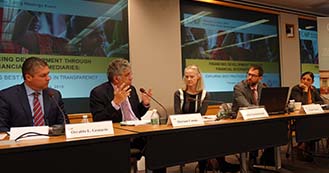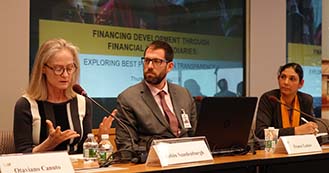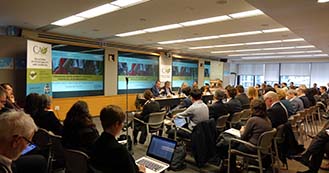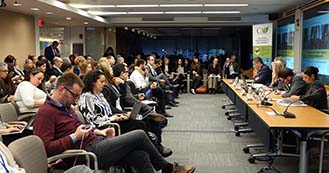Financing Development through Financial Intermediaries: Exploring Best Practices in Transparency

Key takeaways:
• While expectations of privacy have traditionally defined the relationship between banker and client steps toward increased transparency can be observed, particularly in the world of sustainable finance.
• Banks are increasingly disclosing standardized portfolio level information on environmental and social risk as part of industry initiatives or as required by national regulators.
• Disclosure of loans and investments based on client consent is an emerging good practice. This is being driven by the Equator Principles Financial Institutions, the rapidly expanding Green Bond market, and a variety of regulatory initiatives at the national level.
• DFIs such as IFC continue to play an important role in promoting increased transparency and benchmarking good international practice in this field
Panelists:
Otaviano Canuto, World Bank Group Executive Director.
Osvaldo Gratacós, Compliance Advisor Ombudsman (CAO) for IFC and MIGA.
Robin Sandenburgh, Acting Director, Environment, Social and Governance, IFC.
Frazer Lanier, Vice President, Environmental and Social Risk, Citibank.
Nadia Daar, Head of Office, Oxfam International, Washington DC
Summary:
On April 19, 2018, as part of the World Bank Spring Meetings in Washington D.C., CAO hosted a panel discussion on transparency and accountability in the banking sector. The session, attended by over 100 participants and broadcast online, provided an opportunity for representatives of the IFC, the banking sector, and civil society to discuss emerging good practice in the world of financial sector transparency.
Gratacós introduced the discussion acknowledging the important role that IFC has played as standard setter and promoter of good practice in the world of sustainable finance. He framed the discussion in terms of IFC’s commitment to transparency and accountability as “fundamental to fulfilling its development mandate and to promoting the profitability of investments.” This sentiment was echoed by Canuto who said that “transparency is of the essence” in development finance. Similarly, Sandenburgh, pointed to IFC’s new Transparency and Disclosure Toolkit as “an opportunity to magnify IFC's development impact in emerging markets and fragile and conflict situations” by shedding light on how the private sector contributes to sustainable development. Daar referred to civil society research and emphasized the importance of being able to “follow the money” in order to ensure that support for financial intermediaries has the anticipated positive development impact.

Panelists shared examples where financial institutions do disclose projects they support. Sandenburgh noted that IFC is now committed to disclosing all projects financed by the private equity funds that it invests in. Gratacós highlighted the growing green bonds market, noting that the Climate Bonds Standard calls for disclosure of the end use of funds in most circumstances. Both Daar and Lanier discussed commitments to transparency and disclosure under the Equator Principles, a voluntary environmental and social risk management framework subscribed to by 92 financial institutions in 37 countries. Under the Equator Principles members (Equator Banks) disclose portfolio level environmental and social data as well as the project name, sector, and location of project finance transactions based on agreement with the borrower. To date, 63 Equator Banks have disclosed this information in relation to one or more projects they have financed. In total, these banks have disclosed over 1,600 projects financed since 2014. Talking to Citibank’s experience as an Equator Bank, Lanier said that obtaining borrower consent to disclosure of project finance transactions is rarely, if ever, a problem. However, Lanier noted that disclosable project finance transactions currently represent only a small proportion of Citibank’s overall lending portfolio, but said that Citibank is keen to “raise the bar industry wide.”
Sandenburgh talked to tensions between IFC’s commitment to lead in relation to issues of sustainability and the realities of working in markets where attention to environmental, social and governance issues is less developed. Participants agreed that engaging both banks and banking regulators is crucial to advancing the agenda. In this context, Sandenburgh described IFC’s work with the Sustainable Banking Network, noting that this group national regulators and banking associations from 35 countries provides a strong platform for promoting good international industry practice among members. Participants discussed innovations from a several countries. Canuto spoke to advances from Brazil including Central Bank requirements for enhanced reporting on environmental and social risk as part of Basel III international regulatory framework. Gratacós referenced the Guidance Note from the Chinese Banking Regulatory Commission establishing a framework for disclosure of information about international projects funded by Chinese banks. He also spoke to the Dutch Banking Sector Agreement which includes provisions for standardized disclosure in relation to environmental, social and human rights risk.
Daar noted that a wealth of financial information is available to those who have the means to pay for expensive subscriptions to services such as Bloomberg Terminal and Thomson One but that this information isn’t readily accessible to project affected people or the civil society organizations that represent them. She called for DFI’s to commit to disclose information about the high-risk projects that their financial intermediary’s clients are funding. In response to this observation, one audience member suggested that DFIs might start by committing to public disclosure of information that is already disclosed through the Equator Principles framework or behind the paywalls of financial information services.

An interactive discussion ensued after the panelist’s remarks. Several participants called for more access to information about the types of projects that IFC financial intermediary clients are investing in, particularly when these involve activities with significant environmental and social risk. Another suggested that as a first step to greater transparency, IFC might itself disclose financing that has already been consensually disclosed through Equator Banks and other DFIs. Participants also asked for more information about circumstances in which national law might prevent enhanced disclosure by a bank, even with borrower consent.
One question from the floor related to the circumstances in which CAO can take a complaint about the impacts of IFC investments in banks and funds. In response Gratacós noted the importance of investments through financial intermediaries to IFC’s business model. In this context, he emphasized the value of having CAO accept complaints from people who are affected by the businesses that IFC banking clients are supporting. At the same time, he spoke to the challenges involved in determining when an IFC’s banking client’s exposure to a project is sufficient to justify CAO’s involvement.
Gratacós and Canuto concluded the session thanking participants and acknowledging the need for continued dialogue on these issues.


